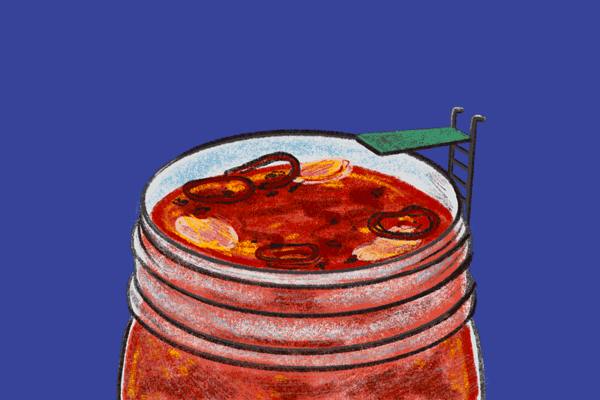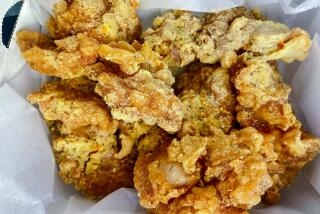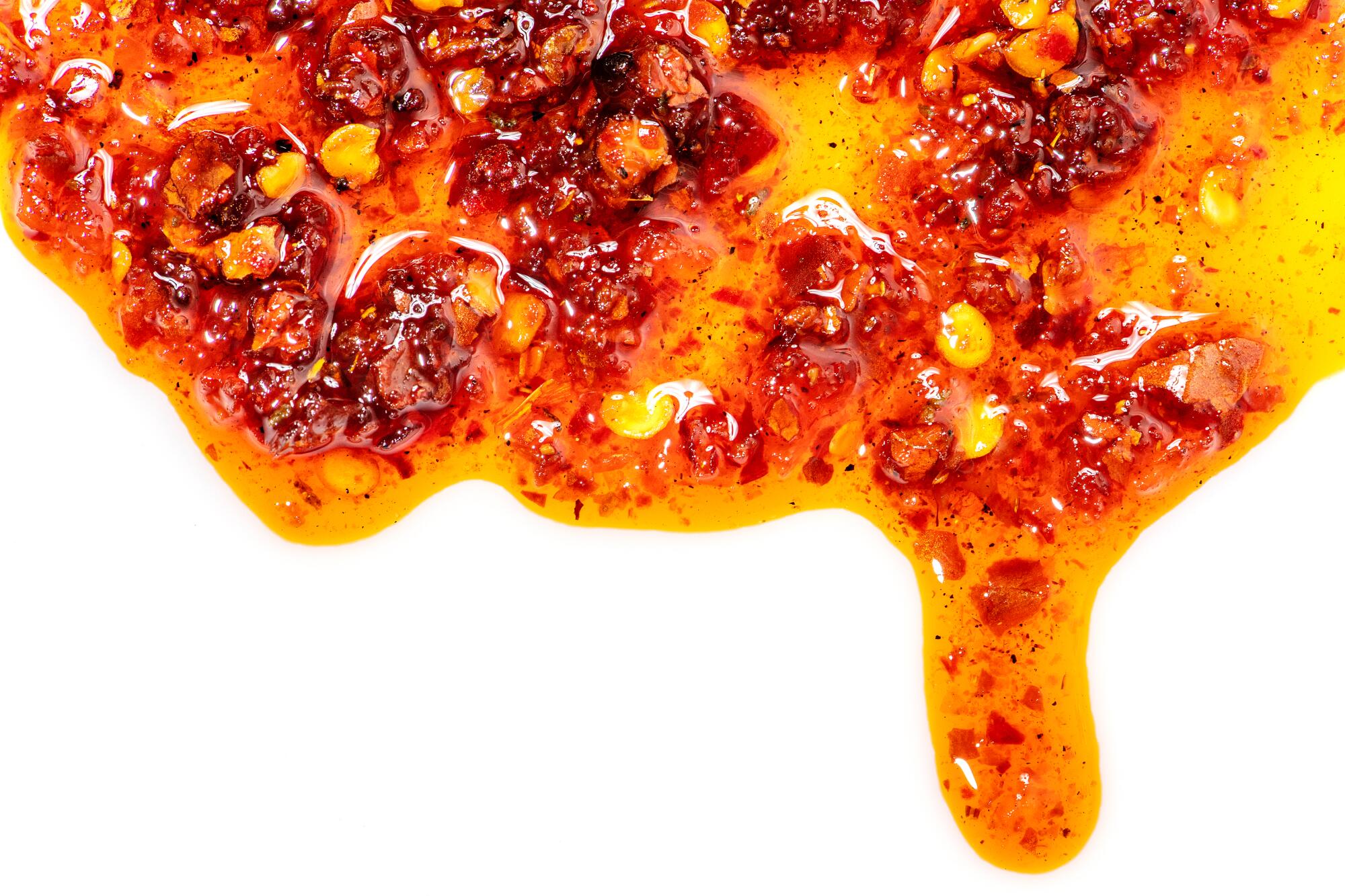
Momofuku wants ‘chili crunch.’ Fly by Jing wanted ‘Sichuan chili crisp.’ Why they shouldn’t have it.
Imagine walking into a grocery store and seeing a single brand of each item. Identical squeeze bottles of “Ketchup.” One company’s “Mustard.” One brand of “Salsa.” Just one maker’s “Hot Sauce.” What a bland world it would be.
If Momofuku has its way, the only “Chili Crunch” on store shelves will bear the name Momofuku.
Momofuku, founded by chef David Chang, acquired the rights to use “chile crunch,” spelled with an “e,” last year from Chile Colonial LLC, a Denver company that registered the trademark in 2015 with the United States Patent and Trademark Office after making a Mexican-inspired chile crunch sauce since 2008. Then on March 29, Momofuku filed a trademark application for the term “chili crunch,” spelled with an “i,” and started sending cease and desist orders to multiple businesses selling chili crunch products, the Guardian first reported.
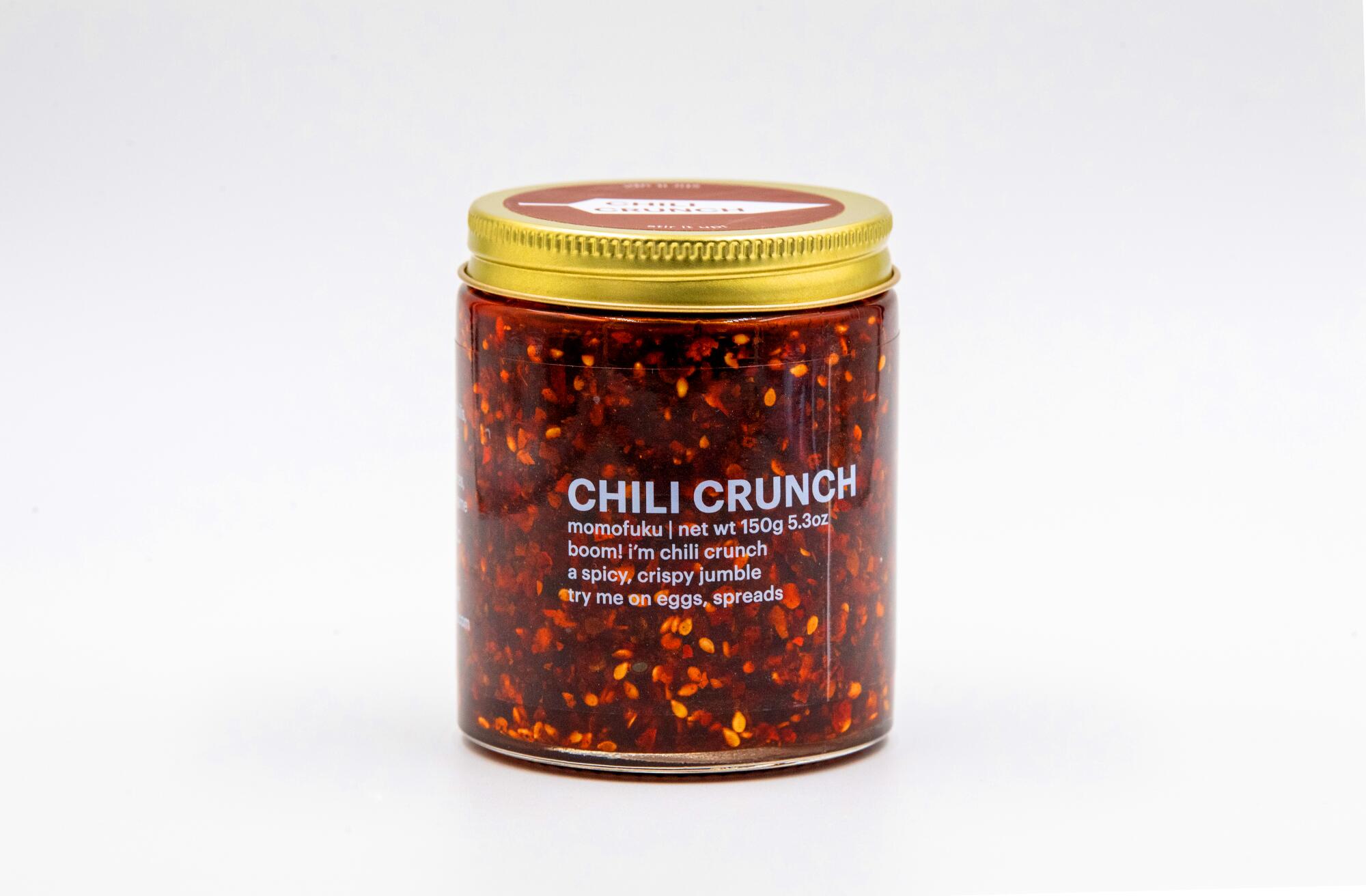
Social media backlash immediately followed. Actor Simu Liu, who serves as the chief content officer for MìLà, a food and beverage company that makes frozen dumplings and chili crunch, challenged Momofuku to a blind taste test on Twitter last week: “Winner keeps the name, loser (it’ll be you) backs off.”
In a statement to The Times, a spokesperson for Momofuku said the company has seen multiple chili crisp products rebranded as chili crunch over the last year, and that the trademark was never intended to “stifle innovation in a category that we care deeply about.”
“When we created our product, we wanted a name we could own and intentionally picked ‘Chili Crunch’ to further differentiate it from the broader chili crisp category,” the spokesperson wrote in an email. “We worked with a family-owned company called Chile Colonial to purchase the trademark from them. They have defended the trademark previously against companies like Trader Joe’s.”
One of the voices critical of Momofuku threatening legal action against other chile sauce businesses was Fly by Jing chef and entrepreneur Jing Gao. She started bottling Sichuan chili crisp in 2018, and is often credited as the catalyst for the mainstreaming of chili crisp. She is also an investor and advisor in Homiah, one of the brands that received a cease and desist letter.
Gao’s own company, as multiple outlets reported, filed to trademark “Sichuan Chili Crisp” in 2019 only to see its application dismissed in 2020.
“The ‘chile crunch’ trademark should also not have been granted,” wrote Gao in a Substack newsletter titled “On Trademark Bullies.” “It is a descriptive term for a cultural product, one that has existed in Chinese cuisine for hundreds of years.”
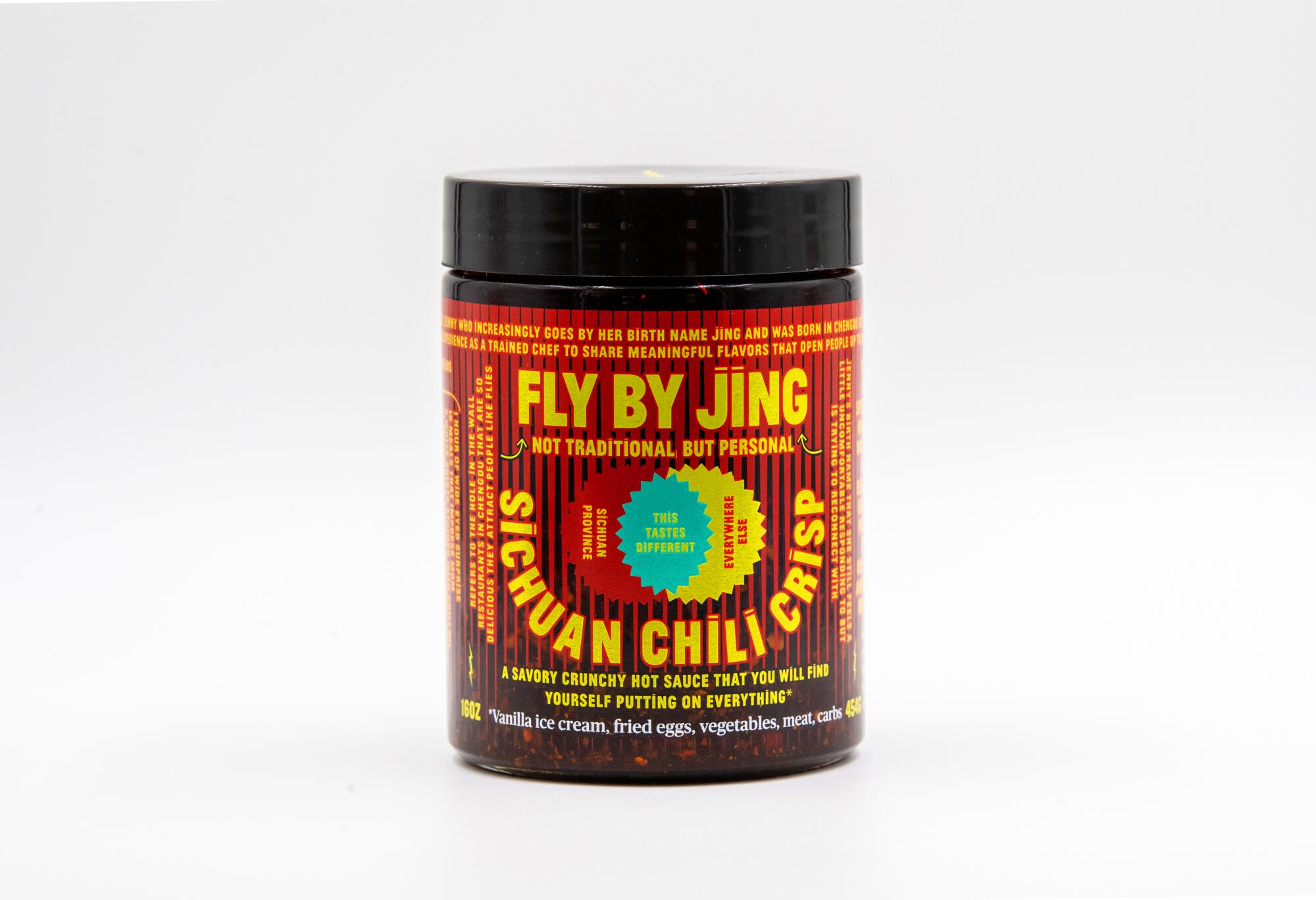
What the newsletter and other stories did not mention , however, is that last week, on April 3, Fly by Jing filed again to trademark “Sichuan Chili Crisp,” according to the U.S. Patent and Trade Office. Then on Monday, Gao said in a statement to The Times that she requested to withdraw the application.
Gao said Fly by Jing reapplied for “Sichuan Chili Crisp” as well as “Chengdu Crunch” “to safeguard against the potential that we need to defend ourselves against a larger power that may be threatened by our existence. In light of the events of the last two days however, we now believe that there’s been enough awareness raised about the descriptive nature of the term, that the USPTO will reconsider the chili/chile crunch trademarks, and we felt comfortable with filing a request to abandon the application for our product’s name, which we have already done as of Saturday.”
“Even if we were granted the trademark for Sichuan Chili Crisp, which we have now abandoned, Fly By Jing would not have used it to intimidate small businesses,” wrote Jing.
The flavors of Sichuan spice up Thanksgiving when Fly by Jing founder Jing Gao makes jiaoyan turkey, mala stuffing, chili crisp mac ‘n’ cheese and more. ‘Thanksgiving, to me, is the most personal meal.’
Yet if Fly by Jing had been granted a trademark, the company would be responsible for enforcing it, as outlined by the United States Patent and Trademark Office. By not protecting your trademark, you could lose it.
If I had my way, neither term would be trademarked.
David Tran, founder of the Huy Fong Foods Sriracha sauce, never sought to exclusively own the term “Sriracha.” Instead, he trademarked his signature rooster logo and bottle.
I reject the notion that someone could exclusively own something so ingrained in my culture, a food I consider an intrinsic part of my identity. These trademarks will limit who can profit off a food with a connection to entire cultures. It would be like someone trying to trademark salsa macha and salsa verde. Wait, inexplicably somebody did trademark salsa verde, signaling a serious problem with the USPTO lacking the knowledge to accurately or fairly determine what’s descriptive or confusing when it comes to certain foods.
I, like many Chinese Americans, feel a sense of pride and ownership over the condiment typically made with garlic, other alliums, chiles and oil. Whether you call it crisp, oil, crunch or sauce, it’s a condiment that’s integral to the cuisines, cultures and experiences of Asian Americans around the world.
Michelle Tew, founder and CEO of Homiah foods, called receiving her cease and desist letter a “punch in the gut.”
“Homiah’s Sambal Chili Crunch product is personal and based on a family recipe from my Granny Nonie dating back to countless generations of Nyonya heritage in Penang, Malaysia,” Tew wrote in a statement on LinkedIn. “I was shocked and disappointed that a well-known and respected player in the Asian food industry would legally threaten me — a one-woman show operating on a much smaller scale — from selling a product that is part of my family’s history and culture.”
The move to trademark “chili crunch,” whether intentional or not, will only serve to whitewash an entire genre of chile sauces. Although some of the sauce companies have strong financial backing — according to Forbes, Momofuku raised $17.5 million in funding last year with $50 million in sales, MìLà recently raised $22.5 million and Fly by Jing raised 12 million last year — many of these products are made by small AAPI-owned companies.
All deserve a piece of the more than $3 billion hot sauce industry in the United States. And that number is expected to nearly double in the next decade, according to a market report by Fortune Business Insights.
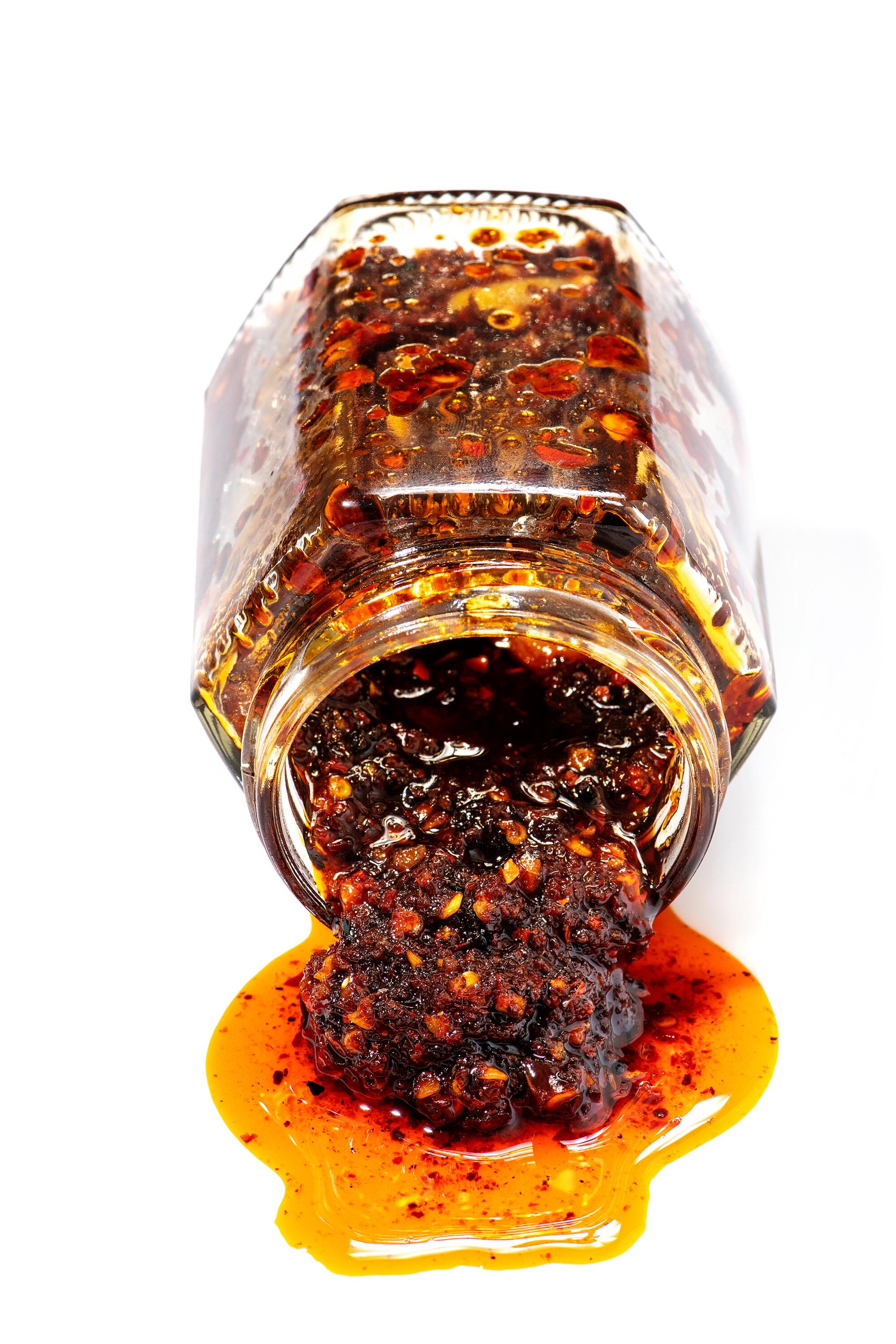
Melody and Russ Stein’s pizza company Pi00a (pronounced pie-oh-ah) started selling jars of chili crunch when they launched a ghost kitchen in Koreatown last year with their children, Taysia and Rylan. Pi00a is a Deaf- and family-owned business, selling Neapolitan pizzas with Asian influences and a mission to provide jobs for the hard of hearing.
For a soppressata pizza, Melody came up with her own version of chili crunch, something “sweet and spicy” that goes with the Italian dry salume, she said over the phone with her daughter as interpreter. “People liked it and started asking for jars of it,” and Pi00a now sells about 100 jars a week through its online business and 40 retailers.
“We just started our small business, it costs a lot of money to rebrand. It’s very difficult to absorb any added expense. We just hope [Momofuku] realizes the impact this has on the community and they drop the trademarks.”
Kansas City chef James Chang, who makes a chili crunch of his own, wrote in an Instagram post referencing the cease and desist letters, “While I have not received one yet it’s only a matter of time. ... For someone that has railed against how ethnic aisles in grocery stores do not have enough minority-owned brands [David Chang] is doing just the goddamn same. Instead of creating a community he wants to create a monopoly.”

You can find a jar of chile sauce that’s half oil, half chile-and-garlic sediment on the tables at most restaurants serving dumplings in the San Gabriel Valley. Many make the sauce themselves.
Before it was a trendy condiment found at every superette (and even Costco), there were half-empty jars of Lao Gan Ma spicy chili crisp with crust around the lids in my fridge and on my family dinner table. My Chinese grandmother and uncle introduced me to Lao Gan Ma spicy chili crisp in the late ‘90s. It’s a sludge-like combination of dried chiles, crispy onions, MSG and fermented soybeans. For years I called it chili crunchy. I could never remember the name, and simply asked for more of that “chili crunchy stuff with the stern lady.”
The sauce was created by Tao Huabi in Guizhou, China, in 1984. Hers is the face on every bottle.
This homemade chili crisp recipe inspired by Lao Gan Ma Chili Crisp is the best condiment. It’s savory, crunchy, oily, spiced but not too spicy.
Nearly a decade ago, I brought Lao Gan Ma to a hot sauce taste-off with the late Jonathan Gold and Kogi BBQ chef Roy Choi. The chili crunchy stuff with the stern lady on the bottle was the clear winner.
“Sauce invented by our ancestors, our version perfected for 30+ years ... ,” wrote the makers of Bowl Cut chili crisp on Instagram. “No one should own a trademark for the description of a sauce that’s been around forever.”
Chili crunch belongs to everyone.
Deputy Food editor Betty Hallock contributed to this report.
More to Read
Eat your way across L.A.
Get our weekly Tasting Notes newsletter for reviews, news and more.
You may occasionally receive promotional content from the Los Angeles Times.

